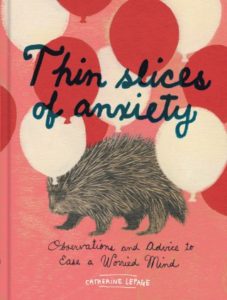Thin Slices of Anxiety: An Illustrated Meditation on What It’s Like to Live Enslaved by Worry and How to Break Free
HEALTH, 4 Jul 2016
Maria Popova | Brain Pickings – TRANSCEND Media Service
A guided tour of this pernicious prison of the psyche, honest and assuring in its honesty.
 Kierkegaard called anxiety “the dizziness of freedom” and believed that it serves to power rather than hinder creativity. For Darwin, it was a paralyzing lifelong struggle — he accomplished his breakthroughs not because of anxiety but despite it. “Anxiety,” Anaïs Nin wrote in her diary, “makes others feel as you might when a drowning man holds on to you.”
Kierkegaard called anxiety “the dizziness of freedom” and believed that it serves to power rather than hinder creativity. For Darwin, it was a paralyzing lifelong struggle — he accomplished his breakthroughs not because of anxiety but despite it. “Anxiety,” Anaïs Nin wrote in her diary, “makes others feel as you might when a drowning man holds on to you.”
Anxiety belongs to the broader complex relationship between creativity and mental illness, and although the causal direction of that relationship might forever evade us, it is strangely assuring to know that other minds — especially minds of above-average intelligence and creative ability — have been savaged by this blunt-toothed beast.
Such solidary consolation is what Montreal-based designer and illustrator Catherine Lepage offers in Thin Slices of Anxiety: Observations and Advice to Ease a Worried Mind (public library) — an illustrated meditation on what it’s like to live enslaved by one’s own worries and what one can do to break free.
To continue reading please Go to Original – brainpickings.org
DISCLAIMER: The statements, views and opinions expressed in pieces republished here are solely those of the authors and do not necessarily represent those of TMS. In accordance with title 17 U.S.C. section 107, this material is distributed without profit to those who have expressed a prior interest in receiving the included information for research and educational purposes. TMS has no affiliation whatsoever with the originator of this article nor is TMS endorsed or sponsored by the originator. “GO TO ORIGINAL” links are provided as a convenience to our readers and allow for verification of authenticity. However, as originating pages are often updated by their originating host sites, the versions posted may not match the versions our readers view when clicking the “GO TO ORIGINAL” links. This site contains copyrighted material the use of which has not always been specifically authorized by the copyright owner. We are making such material available in our efforts to advance understanding of environmental, political, human rights, economic, democracy, scientific, and social justice issues, etc. We believe this constitutes a ‘fair use’ of any such copyrighted material as provided for in section 107 of the US Copyright Law. In accordance with Title 17 U.S.C. Section 107, the material on this site is distributed without profit to those who have expressed a prior interest in receiving the included information for research and educational purposes. For more information go to: http://www.law.cornell.edu/uscode/17/107.shtml. If you wish to use copyrighted material from this site for purposes of your own that go beyond ‘fair use’, you must obtain permission from the copyright owner.
